26 May 2009
Rob’s Second Transition Network 2009 Conference Post
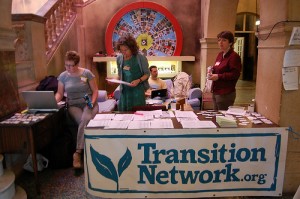 Well. I’m home now, after the exhilarating, exhausting, bedazzling and wondrous 3 days that has been the 2009 Transition Network conference at the Battersea Arts Centre (BAC). What a great three days it has been. The amazing organising team, Jo, Steph and Sim (see left), Kristen and Asha, as well as the wonderful BAC team, made the event a smooth-running success, with the various events fitting together beautifully, and with amazing food. Others have been blogging giving their thoughts on the event, so I am just going to add a few thoughts and observations of my own.
Well. I’m home now, after the exhilarating, exhausting, bedazzling and wondrous 3 days that has been the 2009 Transition Network conference at the Battersea Arts Centre (BAC). What a great three days it has been. The amazing organising team, Jo, Steph and Sim (see left), Kristen and Asha, as well as the wonderful BAC team, made the event a smooth-running success, with the various events fitting together beautifully, and with amazing food. Others have been blogging giving their thoughts on the event, so I am just going to add a few thoughts and observations of my own.
The first thing is a huge apology to everyone who logged on to see the film ‘In Transition’. We had horrible technical issues, which meant, despite Ben trying 5 different laptops and every tweak and change possible, the film refused to play with any sound. We appreciate the disappointment, and shared it greatly. We will show it twice next week, and the dates will be posted here on Tuesday. So, on to some reflections….
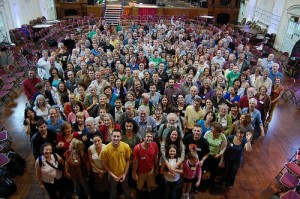 Again, I am not the best person to give a considered overview of the conference, as I don’t think it was really until Sunday that I actually was able to focus on and get involved in any of the actual sessions myself. On Saturday morning, I presented, with Mike Grenville, Charlene Collison and Jacqi Hodgson, a workshop about EDAPs, presenting the current state of play with the concept, from Forest Row and Totnes. I then missed the subsequent Open Space session as I was doing interviews and stuff.
Again, I am not the best person to give a considered overview of the conference, as I don’t think it was really until Sunday that I actually was able to focus on and get involved in any of the actual sessions myself. On Saturday morning, I presented, with Mike Grenville, Charlene Collison and Jacqi Hodgson, a workshop about EDAPs, presenting the current state of play with the concept, from Forest Row and Totnes. I then missed the subsequent Open Space session as I was doing interviews and stuff.
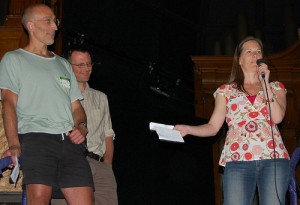 After lunch we had the premiere of ‘In Transition’. Emma Goude, Peter Lipman and I introduced the film (see left), which then ran to the packed hall. At the end, it recieved a standing ovation, a very enthusiastic response. In the feedback and questions session afterwards, the main question that emerged was the fact that the film presents a very white and middle class image of Transition.
After lunch we had the premiere of ‘In Transition’. Emma Goude, Peter Lipman and I introduced the film (see left), which then ran to the packed hall. At the end, it recieved a standing ovation, a very enthusiastic response. In the feedback and questions session afterwards, the main question that emerged was the fact that the film presents a very white and middle class image of Transition.
Lucy Neal from Transition Town Tooting said that she would find it difficult to show the film where she is, given the lack of diversity shown in the film. The response was that the wiki nature of the film meant that the director was only able to use the footage that she was sent, and, in that sense, perhaps the film puts a mirror up to the movement, and whether it likes what it sees or not isn’t the film’s responsibility. There may yet be some changes made to the final film though, before it is released, to address this.
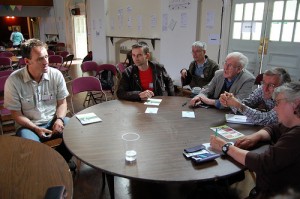 Again, I missed the next workshop session due to giving an interview to a journalist from Sweden whose every question, apart from the last one, was “some people say about Transition that….”, and then some criticism of the idea, it is too naive, it will condemn the Developing World to starvation and so on… it was quite exhausting! Then a good proportion of the participants headed to Clapham Common, some to play football, some to play rounders, and some to dance. I played football for about half an hour, until a huge blister came up on the bottom of my foot and I had to limp off injured. Beautiful sunny evening, and good to be outdoors.
Again, I missed the next workshop session due to giving an interview to a journalist from Sweden whose every question, apart from the last one, was “some people say about Transition that….”, and then some criticism of the idea, it is too naive, it will condemn the Developing World to starvation and so on… it was quite exhausting! Then a good proportion of the participants headed to Clapham Common, some to play football, some to play rounders, and some to dance. I played football for about half an hour, until a huge blister came up on the bottom of my foot and I had to limp off injured. Beautiful sunny evening, and good to be outdoors.
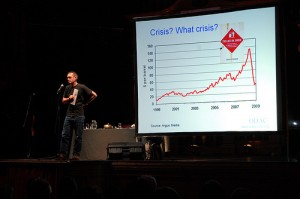 Then we were back for the evening event, ‘Transition Everywhere’. I was compering, and the first speaker was David Strahan (right), who gave an update on peak oil and why it still matters. He argued that the current low prices are actually more harmful than the high prices we saw last summer, and that all the indications are that peak oil is still near at hand, and that the fact that the run up to the price spike last year wasn’t accompanied by increased production, is one indicator that OPEC countries are unable to do so. In the Transition tradition of turning things on their heads, the speakers were invited to ask the audience a question, rather than the other way round. David’s was “how will you continue to argue in your communities for an awareness of peak oil when the oil price is $60 a barrel?”
Then we were back for the evening event, ‘Transition Everywhere’. I was compering, and the first speaker was David Strahan (right), who gave an update on peak oil and why it still matters. He argued that the current low prices are actually more harmful than the high prices we saw last summer, and that all the indications are that peak oil is still near at hand, and that the fact that the run up to the price spike last year wasn’t accompanied by increased production, is one indicator that OPEC countries are unable to do so. In the Transition tradition of turning things on their heads, the speakers were invited to ask the audience a question, rather than the other way round. David’s was “how will you continue to argue in your communities for an awareness of peak oil when the oil price is $60 a barrel?”
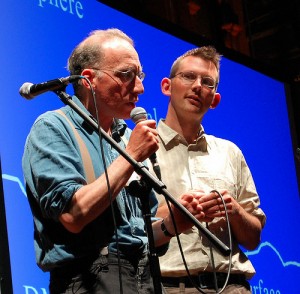 The next speaker was Stephan Harding of Schumacher College who presented a wonderful, hilarious and moving crash course in Gaian science, in spite of a powerpoint presentation that ground to a halt. If only my science classes at school had been like this. He talked about the genesis of the Gaia concept, and about how the mechanistic, dualistic view that saw nature as being like a lifeless machine, and humanity as being separate from it, is at the heart of our current ecological crisis. He held the audience beautifully, weaving a compelling narrative around examples of how nature regulates itself. Wonderful. His question was “is an understanding of Gaia essential in doing Transition?”
The next speaker was Stephan Harding of Schumacher College who presented a wonderful, hilarious and moving crash course in Gaian science, in spite of a powerpoint presentation that ground to a halt. If only my science classes at school had been like this. He talked about the genesis of the Gaia concept, and about how the mechanistic, dualistic view that saw nature as being like a lifeless machine, and humanity as being separate from it, is at the heart of our current ecological crisis. He held the audience beautifully, weaving a compelling narrative around examples of how nature regulates itself. Wonderful. His question was “is an understanding of Gaia essential in doing Transition?”
Then eco-psychologist Mary-Jayne Rust talked about the Resilience of the Heart, and on the subject of ensuring inner resilience. This moved into territory that is not so often explored, and Mary-Jayne set out a number of pointers that people who are active in Transition might build into their work in order to ensure that they avoid burnout and exhaustion. Her question was included in a visualisation about what are the resources that you need in order to cope with times of change.
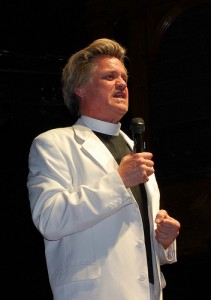 Then I gave a talk, offering an update on Transition, where it has got to and where it might go next. The very final turn of the evening was a special surprise guest, the Reverend Billy of the Church of Life After Shopping. The Reverend is usually accompanied by his 30 strong choir, but they had the night off. A legend in anti-globalisation circles, Billy travels the world, holding ‘services’ in Walmart stores and other such churches of mammon. In between exhortations of ‘Amen!’ and ‘Earthalullah’!, he spoke about his recent trip to Grantham (birthplace of Margaret Thatcher), where “there were many devils to exorcise”, and then their service in a Tescos in Norwich which include an exorcism of a till. Surreal, and, I thought, very funny, although opinion afterwards was divided!
Then I gave a talk, offering an update on Transition, where it has got to and where it might go next. The very final turn of the evening was a special surprise guest, the Reverend Billy of the Church of Life After Shopping. The Reverend is usually accompanied by his 30 strong choir, but they had the night off. A legend in anti-globalisation circles, Billy travels the world, holding ‘services’ in Walmart stores and other such churches of mammon. In between exhortations of ‘Amen!’ and ‘Earthalullah’!, he spoke about his recent trip to Grantham (birthplace of Margaret Thatcher), where “there were many devils to exorcise”, and then their service in a Tescos in Norwich which include an exorcism of a till. Surreal, and, I thought, very funny, although opinion afterwards was divided!
The evening wrapped up, for me anyway, in the bar with the Open Mike session. Last year’s Open Mike was a riot, given that it was residential and everyone got to stay over and party into the early hours… this years was a less well attended, with many people having to set off across London to their accommodation, but it was still quite wonderful. Highlights were William Lana and Oliver from Lewes rapping, Rex Brangwyn’s amazing 3 song set, a guy who worked at BAC who did a rap song about “put your hands in the air if you like big booty’, which we assumed was a comedy routine, but by the third song it was clear wasn’t, and Jo Coish, who was missing putting her kids to bed, singing the song from Mary Poppins she sings them at bedtime (aah). I also rather enjoyed the version of ‘Gloria’ that Klaus Harvey and I knocked out with no rehearsal whatsoever…
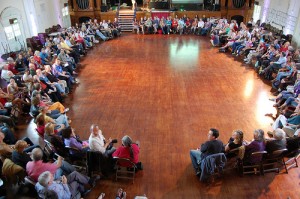 Sunday began for me with David Fleming’s workshop, which I have written about below. Then I drifted around Open Space sessions, which finished by 1, in time for the wrapping up session. The chairs were re-arranged into a big circle (which some commented that they wished we had done at the beginning) and people were invited in pairs to reflect on what they had particularly enjoyed about the conference, what they would do differently next time, and finally, what were the seeds they were taking away with them, and what might they grow into? These were fed back and some useful feedback heard.
Sunday began for me with David Fleming’s workshop, which I have written about below. Then I drifted around Open Space sessions, which finished by 1, in time for the wrapping up session. The chairs were re-arranged into a big circle (which some commented that they wished we had done at the beginning) and people were invited in pairs to reflect on what they had particularly enjoyed about the conference, what they would do differently next time, and finally, what were the seeds they were taking away with them, and what might they grow into? These were fed back and some useful feedback heard.
The session closed with a group singing of a Transition-themed version of Janis Joplin’s ‘Oh Lord Won’t You Buy Me a Mercedez Benz’ song, with new words, composed that morning by Ben Brangwyn while cycling to BAC. Very silly. Then a big group photo (see above). And that was that, with lots of hugs and smiles and exchanging of addresses and laughter.
An amazing 3 days in an amazing venue. The depth and breadth of the workshops was quite something, and the quality of the discussion in the Open Space sessions was quite something to see. It feels like a huge vindication of our strategy of not doing a conference in the traditional way, that the people who come shape it and own it, and that the collective experience of trying this model out can be processed, discussed and reshaped. We wondered if those approaches would still be able to function with such a large number of people (350), but had no reason to. It is very powerful to be able to meet so many people out there doing Transition, and to hear their stories. A heartfelt thanks to everyone who made this event possible, and to everyone who came.
**************************************
Scribings are being written up from the conference, there is a film bring made, there are lots of audio clips on Traydio, and some form of proceedings will follow. You can read John Cossham’s reflections on the weekend here. Many thanks to Mike Grenville for the photos used above, you can see more of his photos of the event here. Next year’s may well be a residential, camping, more outdoors and more hands-on type affair. Watch this space.
Paula Kovacs
26 May 8:57am
Sounds like it was a truly wonderful experience and must have been very nourishing to be part of. I can imagine sitting in that huge circle and feeling very ‘held. – a real sense of community – something sadly lacking in mainstream society. For those of us who couldnt join you all at Battersea, are there any plans to try another internet streaming of the film ‘In transition’ which didnt get shown on Saturday due to technical probs?
julian duggan
26 May 4:04pm
The woolly-jumperyness (white,middle-class) issue is something that needs SERIOUSLY looking at. It can/does loom like a big wall with “Keep Out” writ large. How wide is the community that this ‘movement’ seeks to embrace?
Judith Hoad
26 May 4:39pm
In reply to Julian Duggan – maybe this is an English phenomenon, the “woolly-jumperiness”: here, in Ireland, we have people from all walks of life and African asylum seekers coming to our meetings…………We operate in the ‘no-one-is-front-horse’ tradition and are using the traditional community help system known as the ‘meitheal’ as a template when appropriate. Even using the same language – English – there are differing local traditions all over the British Isles. There are so many useful techniques built into Transition workshops that I’m sure inclusiveness can become a habit everywhere, with a bit of effort……
Josef
26 May 8:15pm
I just had a thought.
A good place to start locating non-white people to get involved would be allotment sites.
In my (rather limited) experience of London allotments there are loads of Afro-Caribbean people there growing food. 🙂
Another would be through church groups (a community space I was involved with in South East London was regularly packed with non-white people because the local church groups hired the space all the time) and mosque’s etc.
Very white and middleclass,
Josef.
PS – If I ever get off the Internet and root myself somewhere I’ll do this myself rather than suggesting it, but thought I share the idea anyway since it really does need to be addressed! 😛
Kevin Wilson
27 May 2:16am
It would be wonderful if one of the showings of In Transition could be at a practical time for us here on the West coast of N America. 7am here is 10am on the East coast and 3pm for you guys in the UK: is much more doable than 5:30 am like the last scheduled time! Or a UK evening slot would be morning for us. Maybe the other showing could be scheduled at a time which worked for other far-flung places like Oz and NZ.
ceridwen
27 May 7:07am
Hi
Yep – I was one of the people who spent 2 frustrating hours on Saturday hoping to see the film.
So – look forward to a chance to see it after all this week. You mention 2 showings – so I guess one of them could be at the weekend – so those of us working during the week can see it.
Even more to the point – it does need to be put out on YouTube (even if it had to be put on there in several installments – ie watch Part 1, then click for Part 2, etc) and then we can be sure of watching it without technical hitches – and at whatever time we wish to.
regards
ceridwen
PB
27 May 8:08am
Sounds like it was a truly wonderful experience and must have been very nourishing to be part of. I can imagine sitting in that huge circle and feeling very ‘held. – a real sense of community – something sadly lacking in mainstream society. For those of us who couldnt join you all at Battersea, are there any plans to try another internet streaming of the film ‘In transition’ which didnt get shown on Saturday due to technical probs?
Paula Kovacs
27 May 8:38am
I like the YouTube suggestion, Ceridwen. Good to see you survived the moneysavingexpert incident
:-). I’ll leave you to explain…
ceridwen
27 May 7:28pm
Hi Paula
errrrr…would that be the one where I blithely announced to a potential – errr…I see its now 3.5 million people that view that website that they could click on to the link I gave and watch the film at that time……….I have no idea how many people read my main “thread” on there and, of that, how many thought “good idea – go for that” and were sitting waiting expectantly too….oh well…..
Shane Hughes
27 May 10:16pm
as a party organiser we used to diversify our attendance by getting performers (in this case speakers) who were icons of the groups we wanted to engage. Put a mirror on the stage and you’ll reflect your audience. there’s no shortage of legendary people from a multitude of backgrounds…
Shane
Shane Hughes
27 May 10:18pm
the above comment is directed as much at our local group events, as it is at the larger events.
Shane
alan clayton
28 May 4:54pm
thanks for doing all this ‘writing up’. Only one of us from kinsale got there (Klaus) but we are all keen to move ahead in any connected way that helps. As an brit living in Ireland I see the ‘wooly pully’ comment as spot on.
If I see one key challenge which I/we face its to bridge the gap between the ‘wooly pully’/’hippyness’ of the whole movement – and that’s just what our local mayor and my own children call it – and those in our communities who have the material resources to make things happen a bit more urgently.
How many people in the Transition movement do YOU know who have the money to build an anaerobic digester for their town ? v the number you know who are students, unemployed, or other similar.
One of the first rules of effective communication (which is large part of what we have to achieve)is that we have to establish rapport with our audience (mainstream citizenry). That happens most easily by imitating the dress code, language, and other behaviour, until such time as we ‘earn’ their respect.
Only then can we hope to influence anything very much.
Alan
mark o'reilly
4 Jun 5:11pm
Agree with the sentiment of Alan and Josef but let’s not forget that in many parts of Britain (especially in the NW) while black and ethnic minority communities are a fundamental target for our work (in areas like East Lancs where 20% of the population is non-white) for the majority of our towns, the problem is one of engagement and understanding, not race.. In Wigan, we need to convince people of all classes that these issues matter.. How do we engage folk from council estates and from gated hill-top residences alike? We need to look at these groups or markets and develop key messages that speak directly to them in terms they can buy in to… We need to look to the way that traditional business identifies, defines and reaches it’s markets… adopting similar processes to help us understand our audience and get our message across.. I am working with a 3rd sector communications consultancy here in the NW to try and make that happen so that we can provide some guidance and input to local TTi’s on the ground…
Dark Optimism » Blog Archive » Despairing of Ed Miliband, Becoming a Filmstar, and Other Adventures
5 Jun 12:02am
[…] having spoken recently in Bungay, Glastonbury, Belsize Park and the Forest of Dean, as well at the Transition Conference (I hate that name, can’t we call it a ‘Gathering’ or something?) in Battersea, […]
Sarah Edwards
11 Jun 5:50pm
Thank you so much for taking the time to write this overview of the conference. I so much would loved to have been there and have been hoping for a peek into what occurred. As an ecopsychologist and US Transition Trainer I was especially heartened to read about Mary-Jayne Rust presentation as I have been integrating ecopsychology into both my T4T’s and our work here with Let’s Live Local, our transition initiatve here in the mountains of CA. She mentioned that a community there in England is connecting their Transition Initiative with the Red Cross. We are doing that here as well. Let’s Live Local initiated the formation the 1st Red Cross Mental Health Response Team in our area and we are now training such teams throughout the county as there are no others currently. As our local team members train such teams for the Red Cross in other communities we hope to introduce Transition Initiative to these communities as well.